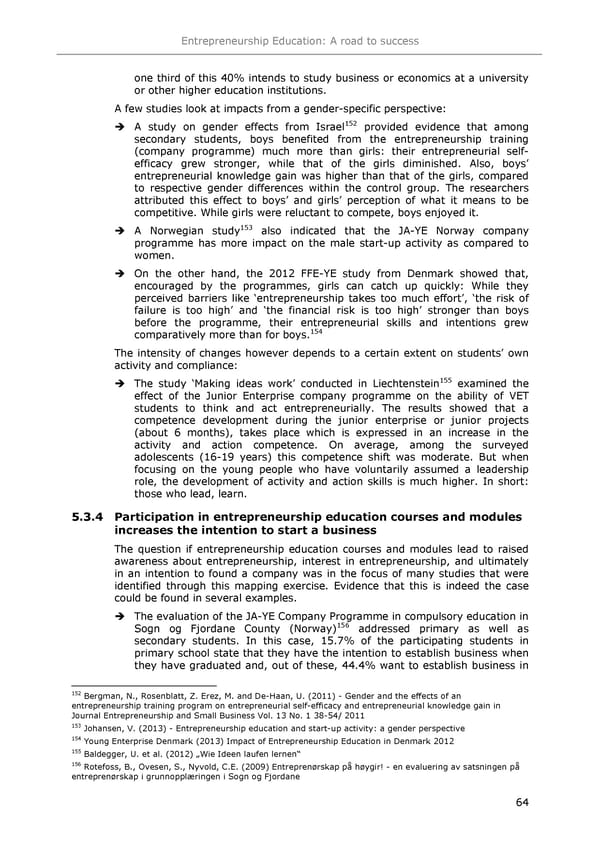Entrepreneurship Education: A road to success one third of this 40% intends to study business or economics at a university or other higher education institutions. A few studies look at impacts from a gender-specific perspective: A study on gender effects from Israel152 provided evidence that among secondary students, boys benefited from the entrepreneurship training (company programme) much more than girls: their entrepreneurial self- efficacy grew stronger, while that of the girls diminished. Also, boys9 entrepreneurial knowledge gain was higher than that of the girls, compared to respective gender differences within the control group. The researchers attributed this effect to boys9 and girls9 perception of what it means to be competitive. While girls were reluctant to compete, boys enjoyed it. 153 A Norwegian study also indicated that the JA-YE Norway company programme has more impact on the male start-up activity as compared to women. On the other hand, the 2012 FFE-YE study from Denmark showed that, encouraged by the programmes, girls can catch up quickly: While they perceived barriers like 8entrepreneurship takes too much effort9, 8the risk of failure is too high9 and 8the financial risk is too high9 stronger than boys before the programme, their entrepreneurial skills and intentions grew 154 comparatively more than for boys. The intensity of changes however depends to a certain extent on students9 own activity and compliance: The study 8Making ideas work9 conducted in Liechtenstein155 examined the effect of the Junior Enterprise company programme on the ability of VET students to think and act entrepreneurially. The results showed that a competence development during the junior enterprise or junior projects (about 6 months), takes place which is expressed in an increase in the activity and action competence. On average, among the surveyed adolescents (16-19 years) this competence shift was moderate. But when focusing on the young people who have voluntarily assumed a leadership role, the development of activity and action skills is much higher. In short: those who lead, learn. 5.3.4 Participation in entrepreneurship education courses and modules increases the intention to start a business The question if entrepreneurship education courses and modules lead to raised awareness about entrepreneurship, interest in entrepreneurship, and ultimately in an intention to found a company was in the focus of many studies that were identified through this mapping exercise. Evidence that this is indeed the case could be found in several examples. The evaluation of the JA-YE Company Programme in compulsory education in 156 Sogn og Fjordane County (Norway) addressed primary as well as secondary students. In this case, 15.7% of the participating students in primary school state that they have the intention to establish business when they have graduated and, out of these, 44.4% want to establish business in 152 Bergman, N., Rosenblatt, Z. Erez, M. and De-Haan, U. (2011) - Gender and the effects of an entrepreneurship training program on entrepreneurial self-efficacy and entrepreneurial knowledge gain in Journal Entrepreneurship and Small Business Vol. 13 No. 1 38-54/ 2011 153 Johansen, V. (2013) - Entrepreneurship education and start-up activity: a gender perspective 154 Young Enterprise Denmark (2013) Impact of Entrepreneurship Education in Denmark 2012 155 Baldegger, U. et al. (2012) „Wie Ideen laufen lernen< 156 Rotefoss, B., Ovesen, S., Nyvold, C.E. (2009) Entreprenørskap på høygir! - en evaluering av satsningen på entreprenørskap i grunnopplæringen i Sogn og Fjordane 64
 Entrepreneurship Education Page 67 Page 69
Entrepreneurship Education Page 67 Page 69